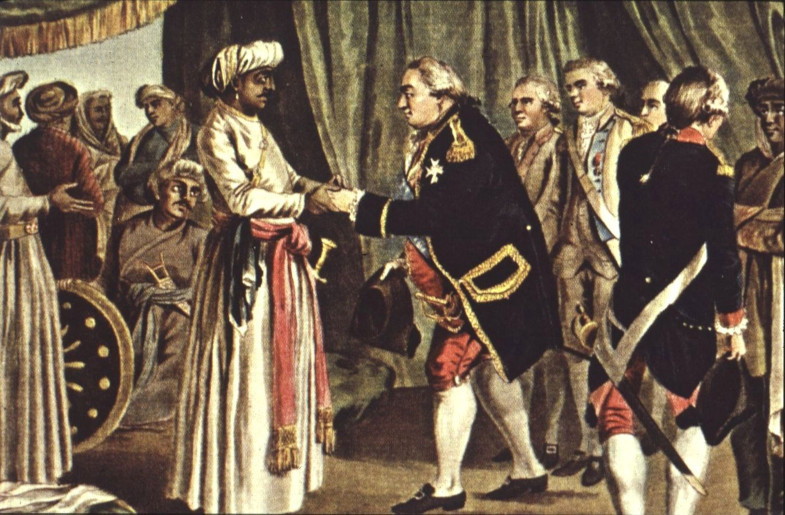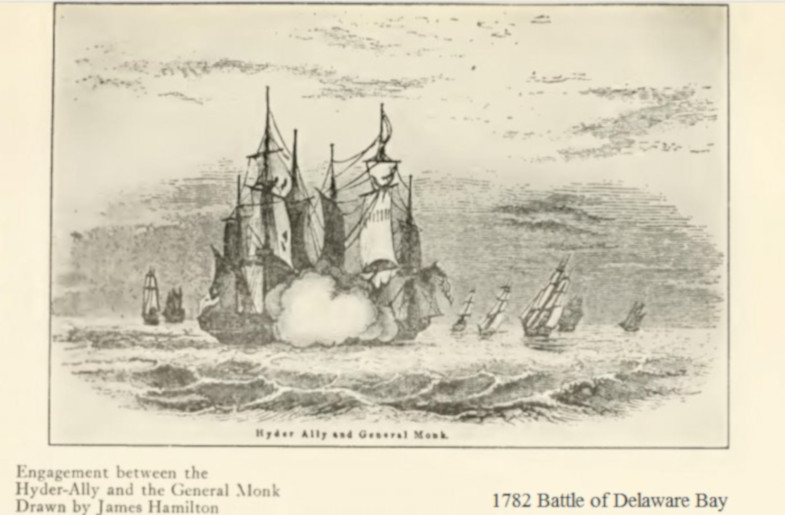
By ASHIR RAO
Courtesy https://indiacurrents.com/ – Article Link : https://bit.ly/395LeBZ
It’s April 8, 1782. The American Revolution is in its seventh year. Lieutenant Joshua Barney of the ragtag American revolutionary Continental Navy is covertly transporting five merchant ships in a convoy with three battleships. All of a sudden, a member of his crew spots three rapidly approaching British ships. They had been spotted! Putting the mission above all else, Barney orders two of his ships to retreat with the merchant ships. As he turns his lone ship around to fend off the assault, the name of his ship shines brightly in the morning sun.
Thousands of miles away from her namesake’s kingdom in India, the American ship “Hyder Ally” is alone in its defense of Delaware Bay.
When Americans began their freedom struggle, there were many powers who had much to gain from the losses of the British Empire. One such power was the Kingdom of Mysore in Southern India. The ruler, Hyder Ali, despised the East India Company. Having already fought a war with the East India Company, he was known far and wide for his gunpowder rockets. In the First Anglo-Mysore War. he successfully defended his kingdom against a joint attack by the East India Company, Maratha Confederacy, and Nawab of the Carnatic.
Mysore and the United States were connected through a common ally — the French. Hyder Ali believed that an alliance with the French was his best chance at driving the British out of India completely. In 1778, three years into the Revolutionary War, the French intervened on the side of the rebels in America. A war between France and Britain meant a global war — they both had colonies all over the world. From 1778 to 1779, the East India Company captured numerous French outposts in India. By 1780, these takeovers posed a threat to Mysore; a waning French presence would strengthen the British as an unchallenged power not only on land but also on the seas. Because of this, five years into the American Revolution, Mysore entered the war on the side of the French.
It is known that the Americans and the rulers of Mysore knew and respected each other. When the Declaration of Independence was signed, Tipu Sultan, son of Hyder Ali, sent a letter to the American Continental Congress in support of American independence. He wrote:
“Every blow that is struck in the cause of American liberty throughout the world, in France, India, and elsewhere and so long as a single insolent savage tyrant remains the struggle shall continue.”
The Lt. General of the Armies of France, Comte de Tressan, also referred to Haider Ali as a ‘brave Moghul Prince’.
It should be noted that Tipu Sultan remains a controversial figure in present discourse for religious overzealousness, especially towards his enemies. Many accounts detailing this were written by his enemies — the British. To this day there is a fierce debate over his legacy.
For a British Empire fighting a protracted war in America, Mysore was a problem. The British East India Company was running into serious losses. The British were forced to dedicate 1/5th of their navy to fend off the joint Mysorean-French assault on Company territory in India and the Indian ocean. Though not directly allied, Mysore tipped the scales of the American Revolution by diverting key British resources to India.
The war in Mysore ended with the Battle of Cuddalore. The war had been going poorly for the British. The battle was a final attempt to capture an important port. The British began with a siege of the fortress at Cuddalore, which was defended by a joint French-Mysorean force. The French navy attempted to attack the blockading ships but were repelled. An attack by soldiers in the fort also failed. The siege was going well for the British. However, as the Russian winter drove back the Nazis in World War II, the Indian summer was the downfall of the British navy. Disease and thirst ravaged both sides, but the British were particularly affected. Eventually, the demoralized British force was forced to leave. The Mysoreans had won the war.
The strengthened French-Mysore forces chipped away at the British, forcing them to increasingly divert military resources to India. While a distracted British was a blessing for America, it was a curse for India in the long term. The reason for the American Revolutionary war was Britain taxing the Americans to pay for their wars. After the American refusal and subsequent war, Britain was still saddled with debt. With not enough revenue from the Americas, the British looked to India to pay for their debts. From then on, Britain focused on conquering India as it was much easier to divide and conquer India with so many small kingdoms.

Back to April 8, 1782 – After staring down three British ships, the Hyder Ally went on a false retreat. Two British ships — General Monk and Fair American — chased. The third British ship was positioned to prevent an escape. During the chase, a British ship — Fair American — ran aground. Having successfully converted the battle into a one-on-one fight between Hyder Ally and General Monk, American Lieutenant Joshua Barney fired his cannons at General Monk’s cannons, flipping them over and rendering them useless. As General Monk drifted closer to Hyder Ally, Barney shouted a false order that caused General Monk to turn and get entangled in Hyder Ally’s rigging. The Americans were prepared. They attached the enemy ship to theirs and opened fire with muskets from the top of the ship. The unrelenting volleys wreaked havoc on the British crew, inflicting heavy casualties. To prevent further losses, the crew of General Monk surrendered and the remaining British ships fled.
Just over a year later, America finally gained independence.
The British, now unencumbered on the American front, were able to focus on Indian territory.
Benefiting from the French being weakened by an internal revolution, a British alliance of convenience with the Nizam of Hyderabad, and destructive fighting with Marathas, Mysore was finally defeated in 1799.
As the sun set in what was once the Kingdom of Mysore, it rose, an ocean away, in the land of freedom — America.
